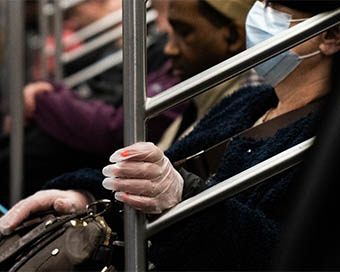Gallery
 PM Modi visit USA
PM Modi visit USA Only the mirror in my washroom and phone gallery see the crazy me : Sara Khan
Only the mirror in my washroom and phone gallery see the crazy me : Sara Khan Karnataka rain fury: Photos of flooded streets, uprooted trees
Karnataka rain fury: Photos of flooded streets, uprooted trees Cannes 2022: Deepika Padukone stuns at the French Riviera in Sabyasachi outfit
Cannes 2022: Deepika Padukone stuns at the French Riviera in Sabyasachi outfit Ranbir Kapoor And Alia Bhatt's Wedding Pics - Sealed With A Kiss
Ranbir Kapoor And Alia Bhatt's Wedding Pics - Sealed With A Kiss Oscars 2022: Every Academy Award Winner
Oscars 2022: Every Academy Award Winner Shane Warne (1969-2022): Australian cricket legend's life in pictures
Shane Warne (1969-2022): Australian cricket legend's life in pictures Photos: What Russia's invasion of Ukraine looks like on the ground
Photos: What Russia's invasion of Ukraine looks like on the ground Lata Mangeshkar (1929-2022): A pictorial tribute to the 'Nightingale of India'
Lata Mangeshkar (1929-2022): A pictorial tribute to the 'Nightingale of India' PM Modi unveils 216-feet tall Statue of Equality in Hyderabad (PHOTOS)
PM Modi unveils 216-feet tall Statue of Equality in Hyderabad (PHOTOS)India Open Competition in Shotgun, organised by the National Rifle Association of India (N
- Hockey India names Amir Ali-led 20-man team for Junior Asia Cup
- Harmanpreet Singh named FIH Player of the Year, PR Sreejesh gets best goalkeeper award
- World Boxing medallist Gaurav Bidhuri to flag off 'Delhi Against Drugs' movement on Nov 17
- U23 World Wrestling Championship: Chirag Chikkara wins gold as India end campaign with nine medals
- FIFA president Infantino confirms at least 9 African teams for the 2026 World Cup
Corona Virus stays for 3 days on plastic, stainless steel Last Updated : 21 Mar 2020 06:25:58 PM IST 
file photo The virus that causes COVID-19 remains for several hours to days on surfaces and in aerosols -- detectable for up to three hours in aerosols, up to four hours on copper, up to 24 hours on cardboard and up to two to three days on plastic and stainless steel, a new study has claimed.
People may acquire the coronavirus through the air and after touching contaminated objects and this is the reason new cases are soaring globally."This virus is quite transmissible through relatively casual contact, making this pathogen very hard to contain," said James Lloyd-Smith, co-author and professor of ecology and evolutionary biology at University of California-Los Angeles."If you're touching items that someone else has recently handled, be aware they could be contaminated and wash your hands," he said in a paper published in the New England Journal of Medicine.The study attempted to mimic the virus being deposited onto everyday surfaces in a household or hospital setting by an infected person through coughing or touching objects, for example.The scientists then investigated how long the virus remained infectious on these surfaces.In February, Lloyd-Smith and colleagues reported in the journal eLife that screening travellers for COVID-19 is not very effective.People infected with the virus -- officially named SARS-CoV-2 -- may be spreading the virus without knowing they have it or before symptoms appear.The biology and epidemiology of the virus make infection extremely difficult to detect in its early stages because the majority of cases show no symptoms for five days or longer after exposure."Many people won't have developed symptoms yet," Lloyd-Smith said. "Based on our earlier analysis of flu pandemic data, many people may not choose to disclose if they do know".Avoid close contact with people who are sick,avoid touching your eyes, nose and mouth, stay home when you are sick, cover coughs or sneezes with a tissue, and dispose of the tissue in the trash.Clean and disinfect frequently touched objects and surfaces using a household cleaning spray or wipe, said researchers.IANS Los Angeles For Latest Updates Please-
Join us on
Follow us on








172.31.16.186







